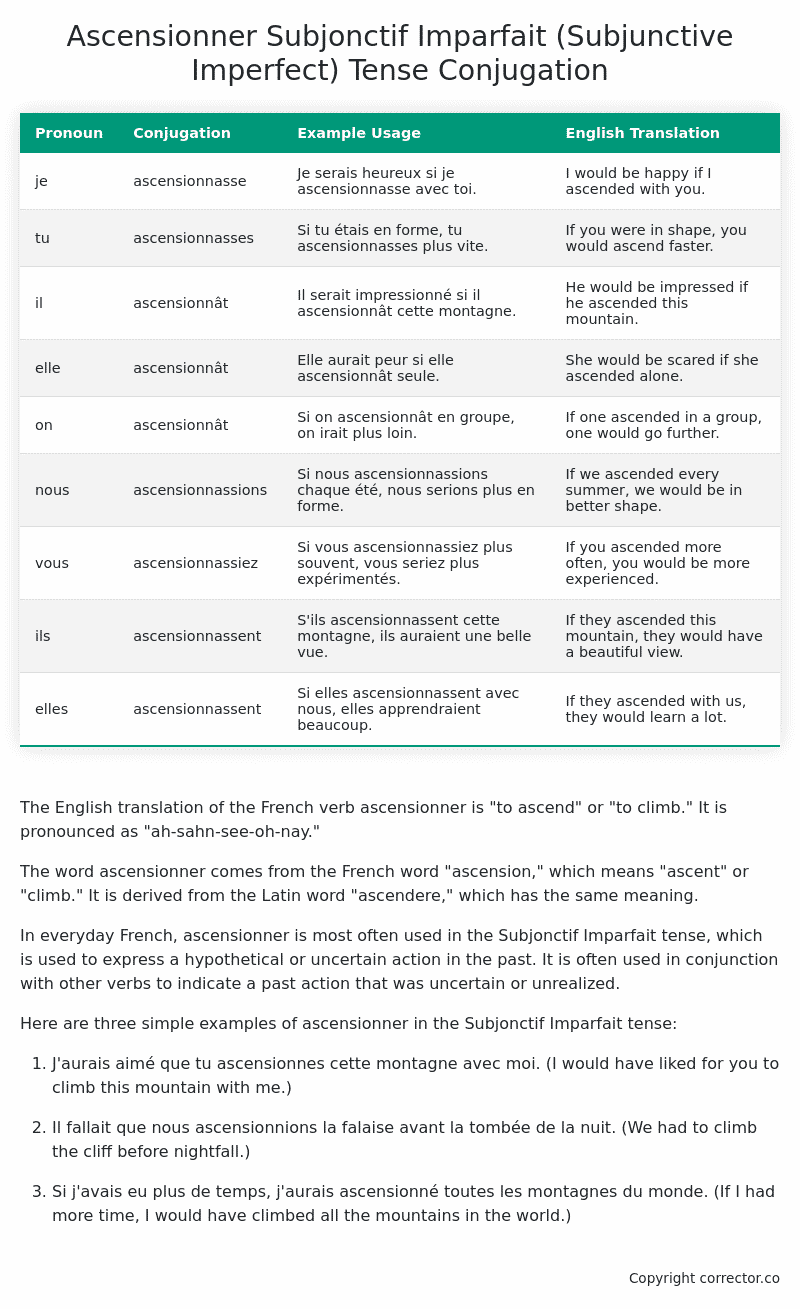Subjonctif Imparfait (Subjunctive Imperfect) Tense Conjugation of the French Verb ascensionner
Introduction to the verb ascensionner
The English translation of the French verb ascensionner is “to ascend” or “to climb.” It is pronounced as “ah-sahn-see-oh-nay.”
The word ascensionner comes from the French word “ascension,” which means “ascent” or “climb.” It is derived from the Latin word “ascendere,” which has the same meaning.
In everyday French, ascensionner is most often used in the Subjonctif Imparfait tense, which is used to express a hypothetical or uncertain action in the past. It is often used in conjunction with other verbs to indicate a past action that was uncertain or unrealized.
Here are three simple examples of ascensionner in the Subjonctif Imparfait tense:
-
J’aurais aimé que tu ascensionnes cette montagne avec moi. (I would have liked for you to climb this mountain with me.)
-
Il fallait que nous ascensionnions la falaise avant la tombée de la nuit. (We had to climb the cliff before nightfall.)
-
Si j’avais eu plus de temps, j’aurais ascensionné toutes les montagnes du monde. (If I had more time, I would have climbed all the mountains in the world.)
Table of the Subjonctif Imparfait (Subjunctive Imperfect) Tense Conjugation of ascensionner
| Pronoun | Conjugation | Example Usage | English Translation |
|---|---|---|---|
| je | ascensionnasse | Je serais heureux si je ascensionnasse avec toi. | I would be happy if I ascended with you. |
| tu | ascensionnasses | Si tu étais en forme, tu ascensionnasses plus vite. | If you were in shape, you would ascend faster. |
| il | ascensionnât | Il serait impressionné si il ascensionnât cette montagne. | He would be impressed if he ascended this mountain. |
| elle | ascensionnât | Elle aurait peur si elle ascensionnât seule. | She would be scared if she ascended alone. |
| on | ascensionnât | Si on ascensionnât en groupe, on irait plus loin. | If one ascended in a group, one would go further. |
| nous | ascensionnassions | Si nous ascensionnassions chaque été, nous serions plus en forme. | If we ascended every summer, we would be in better shape. |
| vous | ascensionnassiez | Si vous ascensionnassiez plus souvent, vous seriez plus expérimentés. | If you ascended more often, you would be more experienced. |
| ils | ascensionnassent | S’ils ascensionnassent cette montagne, ils auraient une belle vue. | If they ascended this mountain, they would have a beautiful view. |
| elles | ascensionnassent | Si elles ascensionnassent avec nous, elles apprendraient beaucoup. | If they ascended with us, they would learn a lot. |
Other Conjugations for Ascensionner.
Le Present (Present Tense) Conjugation of the French Verb ascensionner
Imparfait (Imperfect) Tense Conjugation of the French Verb ascensionner
Passé Simple (Simple Past) Tense Conjugation of the French Verb ascensionner
Passé Composé (Present Perfect) Tense Conjugation of the French Verb ascensionner
Futur Simple (Simple Future) Tense Conjugation of the French Verb ascensionner
Futur Proche (Near Future) Tense Conjugation of the French Verb ascensionner
Plus-que-parfait (Pluperfect) Tense Conjugation of the French Verb ascensionner
Passé Antérieur (Past Anterior) Tense Conjugation of the French Verb ascensionner
Futur Antérieur (Future Anterior) Tense Conjugation of the French Verb ascensionner
Subjonctif Présent (Subjunctive Present) Tense Conjugation of the French Verb ascensionner
Subjonctif Passé (Subjunctive Past) Tense Conjugation of the French Verb ascensionner
Subjonctif Imparfait (Subjunctive Imperfect) Tense Conjugation of the French Verb ascensionner (this article)
Conditionnel Présent (Conditional Present) Tense Conjugation of the French Verb ascensionner
Conditionnel Passé (Conditional Past) Tense Conjugation of the French Verb ascensionner
L’impératif Présent (Imperative Present) Tense Conjugation of the French Verb ascensionner
L’infinitif Présent (Infinitive Present) Tense Conjugation of the French Verb ascensionner
Struggling with French verbs or the language in general? Why not use our free French Grammar Checker – no registration required!
Get a FREE Download Study Sheet of this Conjugation 🔥
Simply right click the image below, click “save image” and get your free reference for the ascensionner Subjonctif Imparfait tense conjugation!

Ascensionner – About the French Subjonctif Imparfait (Subjunctive Imperfect) Tense
Formation
Common Everyday Usage Patterns
Interactions with Other Tenses
Subjonctif Présent
Indicatif Passé Composé
Conditional
Conditional Perfect
Summary
I hope you enjoyed this article on the verb ascensionner. Still in a learning mood? Check out another TOTALLY random French verb conjugation!


